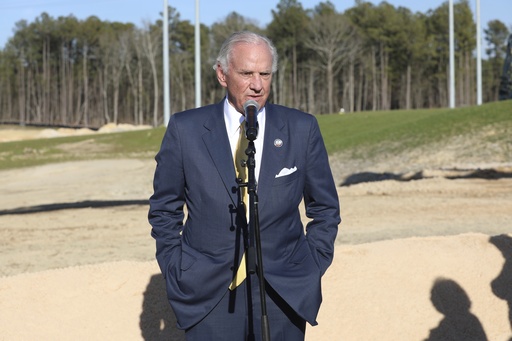
BLYTHEWOOD, S.C. — Scout Motors, backed by Volkswagen, is making significant strides in the electric SUV market by introducing an innovative purchasing experience. Through its app, customers could have the opportunity to buy a vehicle quickly and then manage everything from repairs to software updates all on their handheld devices. However, the company is facing significant challenges in South Carolina, where they are investing billions into a new manufacturing plant, as current laws restrict direct sales from manufacturers to consumers.
In today’s digital era, purchasing online has become the norm for most products, but automobiles remain an exception. Proponents of the traditional dealership model argue that it allows consumers to evaluate pricing across various dealerships. Acquiring a vehicle is not as straightforward as purchasing a pair of pants, as it involves many considerations such as financing, state registration, taxes, various regulations, and often a test drive.
South Carolina is among approximately two dozen states with laws that prevent manufacturers from selling directly to consumers, requiring all new vehicles to be sold through dealerships. Scout Motors aims to challenge this practice not only in South Carolina but across the nation, particularly to benefit electric vehicle manufacturers. Moreover, South Carolina prohibits manufacturers from owning service centers, compelling Scout SUV owners to seek repairs in neighboring states.
Supporters of the dealership model argue that allowing direct online sales could reduce competition and empower manufacturers to raise prices. This model, they contend, ensures that local dealers represent the vehicles they sell, providing a quality service for buyers. Therefore, if issues arise post-purchase, dealers are part of the community, ensuring accountability and support for consumers.
Scout Motors is actively lobbying to change these laws to benefit themselves and other EV makers such as Tesla and Rivian. Their grassroots efforts have included media outreach to secure backing in the Republican-majority state, emphasizing the consumer’s right to purchase directly without mediation. They also reference an advisory opinion from the state’s Attorney General in 2000, which supported manufacturer direct sales under free market principles, although it remains a non-binding interpretation.
According to the company, adhering to the dealership-only model would inflate the prices of their affordable vehicles, hindering the user-friendly experience they aim to deliver. Governor Henry McMaster has acknowledged the potential benefits of the Scout plant in Blythewood and hinted at a desire for direct sales while also protecting the interests of existing dealerships. He noted that with the rise of online shopping, consumers are increasingly seeking an unmediated purchasing experience.
Scout Motors is making its entry into a volatile U.S. electric vehicle market, with uncertainty looming due to possible policy changes under different political administrations which could affect tax incentives and production costs. The original iteration of Scout Motors produced gasoline vehicles for two decades before ceasing production in the 1980s, becoming a collector’s item with lasting influence on contemporary SUV design.
The new Scout Motors is striving to combine nostalgia with advanced technology, and a crucial element of their business model hinges on their mobile application. The aim is for potential clients to explore design choices, performance specifications, and various features in a matter of minutes. All necessary paperwork and financing could be managed swiftly, with the vehicle delivered directly to the buyer’s home.
“It’s a significant point of contention, but also a critical opportunity,” said Cody Thacker, Vice President of Growth at Scout.
Their production facility in Blythewood, located about 20 miles north of Columbia, is targeted to begin operations in 2027, with projections of employing up to 4,000 workers and producing 200,000 vehicles annually. Scout also envisions a testing track adjacent to the plant where customers can take vehicles for a spin before buying, enhancing the overall customer experience.
In 2023, South Carolina provided more than $1 billion in incentives for Scout to establish its plant, a deal that was made before the dealership law became a concern. As Thacker noted, the need for legislative change emerged during discussions about their business framework. Nevertheless, they remain confident in their decision to locate in South Carolina, citing its strong workforce and favorable economic environment. If the law does not budge, the company is prepared to sell through nearby states where regulations are favorable, ultimately sending tax revenue out of South Carolina.

